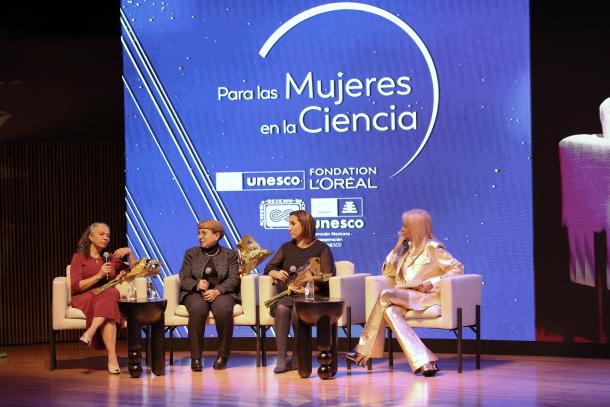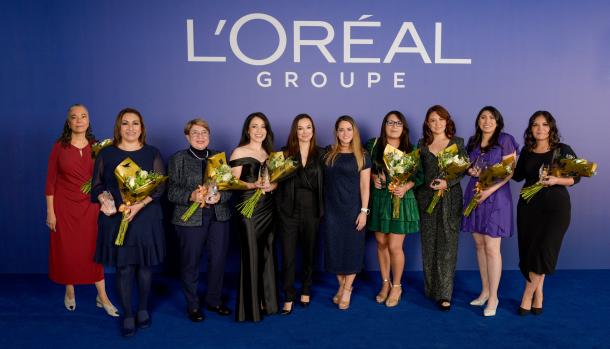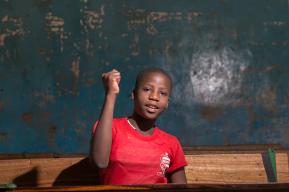News
"For Women in Science" celebrates the first hundred Mexican scientists supported by the L'Oréal-UNESCO national programme

The Roberto Cantoral Cultural Center hosted the award ceremony for Mexican women scientists through the "For Women in Science" initiative, which reached a significant milestone in this edition by recognizing 100 women.
The international programme "For Women in Science" is led by the Fondation L'Oréal and UNESCO, jointly with the Mexican Academy of Sciences and CONALMEX for its national chapter. Since 2007, this initiative has acknowledged and supported the scientific work of Mexican women.
This award contributes to gender equality in science and promotes renewed role models for future generations of women scientists. This year, the national awards and scholarships "For Women in Science" were granted to scientists in exact sciences, natural sciences, engineering, and technology.
Supporting equity
This award recognizes the achievements of the honoured scientists and emphasizes the importance of diversity and inclusion in science, reinforcing L'Oréal's commitment to female empowerment.
Deborah Armstrong, CEO and President of the L'Oréal Group stressed in her opening speech the need to continue supporting women in science and creating environments where all voices are heard and valued. Under the motto "the world needs science, and science needs women," the company reaffirmed its commitment to highlight women's contributions and create platforms to help them pursue their projects.
Armstrong added, "We celebrate 17 years of promoting and highlighting the crucial role of women in science in Mexico. In 2023, we proudly celebrate having recognized 100 outstanding Mexican scientists. Their tireless work and valuable contributions have enriched the scientific field and have been essential in addressing and solving the most critical challenges in our world.
With their dedication and talent, these women have left a lasting legacy that lights the way for future generations, inspiring all individuals to reach new heights in the scientific realm. At the L'Oréal Group, we take pride in being part of this historic mission to highlight and honour the brilliant legacy of these Mexican scientists."
The scientists woman awarded this year has made an indelible mark in their field of study. Their research and achievements are a moving testimony to the power of perseverance and passion in science.
Andrés Morales, the UNESCO Representative in Mexico, highlighted the importance of breaking persistent glass ceilings in scientific fields, with the support of schools, institutions, and companies, promoting equal opportunities, recognition, and rewards regardless of gender.
It is not only a matter of social justice but also of survival, as diverse perspectives and approaches enhance scientific research and increase the likelihood of finding innovative solutions to global challenges.
José Seade, President of the Mexican Academy of Sciences, emphasized that "the role of science and technology in society is vital to improving the quality of life and the socio-economic and environmental situation of any country. Increasing the participation of women in science and technology activities, as well as their contribution and access to them, is essential, and that is one of the priorities of the Mexican Academy of Sciences. That is why the 'For Women in Science L'Oréal-UNESCO-AMC' programme is so important, as it promotes spaces to boost the participation of women in scientific production."
A promising future

The celebration of the first hundred recognized Mexican women scientists, a new chapter opens in the fight for gender equality in science. As more women join the scientific community, the horizon broadens, and opportunities become increasingly equitable. The "For Women in Science" recognitions have paved the way, and their legacy will continue to inspire new generations of scientists in Mexico.
Winners of the For Women in Science Scholarships 2023
Age: 34. National Cancer Institute. Discipline: Exact Sciences. Mexico City.
Project Title: Co-encapsulation of siRNAs-Doxorubicin for the treatment of metastatic breast cancer.
Description: Her research project, "Co-encapsulation of siRNAs-Doxorubicin for the treatment of metastatic breast cancer," addresses a health issue affecting women in Mexico: metastatic breast cancer, which in 2020 was the most common disease (15.3%) and the leading cause of death in women. Despite recent advances, treatments remain limited, and it is essential to develop new therapeutic strategies to improve treatments and ensure patients have a good quality of life.
Age: 33. Center for Genomic Sciences, National Autonomous University of Mexico. Discipline: Natural Sciences. Morelos.
Project Title: Characterization of ancient biomolecules from pathogens causing cocoliztli in individuals from the 16th century in New Spain.
Description: Dr. Miriam Bravo's research represents a significant milestone in understanding a devastating disease that affected New Spain in the 16th century: cocoliztli. An epidemic that decimated the indigenous population during the Spanish conquest, causing massive mortality and leaving a mark in history that has puzzled scientists and historians for centuries. Dr. Miriam's work on the characterization of ancient biomolecules from the pathogens causing cocoliztli is a testament to the power of science to illuminate the mysteries of the past and its relevance to modern medicine.
Age: 36. Regional High Specialty Hospital of the Yucatan Peninsula. Discipline: Natural Sciences. Yucatan.
Project Title: Composition and diversity of intestinal microbiota in patients with renal lithiasis and in control of the state of Yucatan.
Description: She graduated as a Food Chemical Engineer and later pursued postgraduate studies focusing on the effects of traditional Mexican foods. With her project titled "Composition and diversity of intestinal microbiota in patients with renal lithiasis and in control of the state of Yucatan," she discovered that kidney stones are a significant health problem in that region and concentrated on researching strategies to address it. Her study aims to evaluate the effect of diet on the intestinal microbiota of the population with urinary lithiasis.
Age: 32. Institute of Advanced Materials for Sustainable Manufacturing, Monterrey Institute of Technology. Discipline: Natural Sciences. Nuevo León.
Project Title: Development of an edible coating for the preservation of berries.
Description: She studied for a Bachelor's degree in Pharmaceutical Chemistry. She pursued postgraduate studies because she enjoys constant learning and working collaboratively in the laboratory to find sustainable solutions. Her project, "Development of an edible coating for the preservation of berries," acknowledges that Mexico has the potential to produce fruits and vegetables. The losses of these products can reach 50% of production due to a lack of proper infrastructure and physical and microbiological factors. Therefore, she considers exploring sustainable alternatives such as edible coatings based on natural compounds to generate high-value products, reduce waste generation, and extend the shelf life of fruits like strawberries.
Age: 33. Center for Innovation and Technological Development in Computing, National Polytechnic Institute. Discipline: Engineering and Technology. Mexico City.
Project Title: Modeling neuromusculoskeletal systems with biomedical applications based on machine learning and Lyapunov theory.
Description: Dr. Mariana Ballesteros is leading the way with her research that promises to change how we approach a wide range of biomedical applications. Her area of interest lies in the systems of the human body, creating new technologies to assist people with disabilities. Her project, "Modeling of neuromusculoskeletal systems with biomedical applications based on machine learning and Lyapunov theory", focuses on the neuromuscular system, and her plan is to apply the results in rehabilitation engineering created by Mexicans.
Winners of For Women in Science Award 2023
Age: 58. Discipline: Exact Sciences / Materials. Materials Research Institute. National Autonomous University of Mexico. Mexico City.
Description: Dr. Sandra Rodil, from the Materials Research Institute of UNAM, has dedicated her career to the exciting field of materials science, and her work has a direct impact on Mexican society. Materials science research focuses on studying and developing new materials, as well as improving existing ones, with the aim of finding solutions to a wide range of technological and social challenges. The discipline applies to diverse sectors such as industry, medicine, energy, construction, and electronics, and she is one of the scientists focused on this field in Mexico.
Age: 67. Discipline: Natural Sciences / Biology (Parasitology). Department of Infectomics and Molecular Pathogenesis. Center for Research and Advanced Studies of the National Polytechnic Institute. Mexico City.
Description: During her postdoctoral stay at UTHSC in San Antonio, Texas, Dr. Rossana Arroyo began studying the molecular pathogenesis of Trichomonas vaginalis, the causative agent of trichomoniasis, which became her research focus. She conducted her doctoral studies with Entamoeba histolytica with Dr Esther Orozco Orozco, an international laureate of L'Oréal-UNESCO in 2006.
Age: 48. Discipline: Engineering and Technology / Electrochemistry. Center for Research and Technological Development in Electrochemistry, S.C. (CIDETEQ). Querétaro.
Description: She graduated in Environmental Engineering with a Master's degree from the University of Guanajuato, a Doctorate at CIDETEQ, and a postdoctoral stay at CINVESTAV-IPN. Her current research focuses on the development of modified surfaces for the removal and detection of contaminants with economic, environmental, and social importance.








